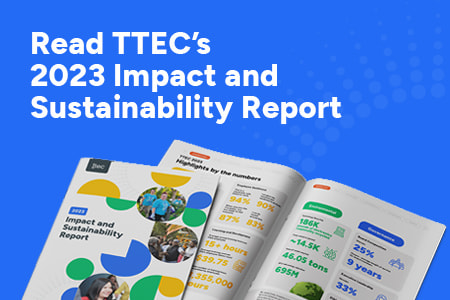The contact center of the future will be radically different from that of today: new technologies are opening new opportunities as well as presenting new challenges. The changes are not just technical – the demands on agents are also changing; requiring both better problem-solving skills and enhanced emotional intelligence (EQ). Learn more in episode four of the CX Pod Europe as we feature a conversation with Peter Dorrington, Director of Customer Insights as he explores what the ‘Contact Center of the Future’ will look like.
Episode Transcript:
Neil Russell-Smith: Welcome to the CX POD Europe from TTEC your customer experience podcast providing thought leadership and executive Insight on customer issues. Today we're here to talk about the contact center of the future. So to join us in the studio today we have Peter Dorrington Director of Insights here at TTEC. Welcome Peter thanks for joining us. So we'll jump straight in shall we! There's been a lot of speculation recently about what the contact center of the future will look like what's your view?
Peter Dorrington: Well, I think the transformation is already happening. We've seen it with the transition from the voice only call center to the omni-channel contact center, but it's still an evolution, it's on its way to the multi-channel experience center where it's not just about the purpose of the call and the content but how that's perceived and the real difference is it makes the people's lives.
Neil: Great. So you said it will be built around the customer not necessarily the operation?
Peter: Yes. So at the moment a lot of the effort that's been going into optimising contact centers, about improving operational efficiency, making it easier for their customers, and focusing on things that we think drive satisfaction. But ultimately the arbiter of whether a customer experience works or not is the customer themselves. So they're interested in things that perhaps go beyond the kind of operational measures that we've already become comfortable with. Now that also means that we have to be able to reflect their channel of choice the context that they find themselves in which can often be when I'm doing something in the middle of the night and I'm feeling very stressed. That's a completely different experience from doing something in the middle of the day and I'm feeling very relaxed and and of course, we now have to throw into that mix a whole range of new technologies. Technologies which enable us to have virtual contact centers. So people that don't have to come together in a great big office to run that. As well as things like AI and Bots and robotic process automation in the background.
So lots of automation taking over some of the routine tasks and what's left is the more human feeling part of a contact center. So the contact center of the future is definitely going to be more human shaped, it's going to be more about outcomes and experiences than experience with which are delivered on efficiency.
Neil: Great. Okay. So, what does that mean then for those working in the contact centers? Are their jobs going to disappear?
Peter: Well, there has been a lot of speculation recently from pundits about the impact of things like robotics, automation, and AI on jobs and one futurist in Japan recently said that up to 50 percent of all jobs will be lost to AI.
Now I think that's actually probably about the case, but it's a bit like the way that automation impacted manufacturing when we look at things like AI and robotics. They're having the same impact on the services sector as automation had on manufacturing that didn't get rid of jobs per se what it did do was evolved jobs. So fewer people who are more skilled and have new access to technologies are able to do more complex things and the skill-based changed. So what we're going to see is the evolution of contact center workers who are better able to deal with demands of creativity and uniqueness and the kinds of things that aren't easy to automate and therefore they're going to be more skilled. They're going to get more satisfaction themselves out of their roles and they're going to deliver a more human sized experience to customers and the customers themselves are now expecting that more and more people are less dependent upon voice. And in fact, their preference is not originally voice. It might be chat or instant messaging or actually using social media to communicate.
So there's definitely going to be a shift in the pattern of work and the kinds of workers that we need within these experienced centers, but it's not going to get rid of all jobs. And even if we went to the fullest extent of AI that we could today there will always be circumstances where humans want to talk to another human being when they want to feel that they've been heard and understood and particularly when they're in crisis or under stress.
So at that point, I do not want to be navigating my way through a chatbot or IVM, IVR, I want to talk to a human being directly.
Neil: Yeah. I can certainly vouch for that one Peter, I have to agree. I guess we're talking about a blend really aren't we? Between that, you know the humans, the personal sort of side of things and technology obviously, which we rely on so heavily today, so I guess you know when you talk about super agents, then you know where they going to come from?
Peter: Well some of them already exists. So in every contact center, we see people who are more skilled at dealing with customers in a way that delights and delivers the experiences that people expect but this is not going to be in the future the kind of role where we go for low pay low skill what need to do is attract the right kind of people who have the attitudes towards delivering customer experience. So we have to go find those people, people who are probably thinking in the future that working in an experience center is more of a career choice than a gig so it's not low pay low skill. But even if we have to attract them, we have to unboard them quickly and bearing in mind that automation is going to take all of the standardised repeatable stuff out of process what's left is more complicated by its very definition. It's not something that would be easy to program.
And therefore require more creative thinking the ability to take the right attitude, with the right knowledge, and the right skills and that leads to training and then we need to motivate and retain these people. So we need to keep their levels of productivity up. We need them to feel that they're being fulfilled in their role because they're going to become a more expensive more vital resource.
So to find these super agents firstly we have to find the right kind of people then we have to get them on board and productive as quickly as we can but allow them to grow through training and learning interventions and the use of systems and ultimately focus on their motivation and retention because it's going to take them time to become proficient and we simply cannot live with the levels of attrition which had hitherto been associated with contact center working. So these super agents are going to become super and that also means that they're going to become more attractive to other people. So the trick will be is sometimes the axiom goes, "Train them so well that people find them attractive to hire but motivate them so well that they'll want to stay."
Neil: Great. Okay, so I guess yeah, we can also say it is about the employee experience, you know, that would ultimately lead to a greater customer experience when you're looking at the kind of brands that providers like ourselves or others obviously look to to support. So when you talk about AI Bots, you know an RPA so to speak how do you think they're gonna fit into this mix?
Peter: So we're going to have a blended environment and it's already sensible and indeed there's a commercial imperative to use bots and AI to do the low value repetitive kinds of tasks which really take up a lot of time but don't add a lot to the process and also automation allows for the unending corporate memory. So we will remember a customers will remember their details, but we're moving towards smarter decision making so though front end of bots and AI, will help users self-service. So we'll be able to go to our app or a digital channel or even through voice and potentially video and serve ourselves when we have a query but we can then ask escalate that to human interactions. So our chat becomes less synthetic and more authentic and if necessary, I can actually talk to a human but in the blended environment will be your have to flip forward and backwards between these digital and analog channels.
So it's appropriate at certain points for humans to add value. But then we may want to go back and complete a process through an automation and I do see the blended environment as this mix of the digital and the human worker working like colleagues the side by side. So we're not saying that all of these operations go to the robotic part of the business and all of these operations always go to the human side. It's picking the right resources at the right time. Now as we move more towards experienced centers that's becoming more and more driven by the customer themselves, so what's right for them will change with the context. To use the example before you know, if my car breaks down in the middle of the night and I'm in a dark spooky kind of place. I want immediate support and help if my car breaks down in the middle of the day and I'm one mile from home. I'm slightly less stressed. I'm more accepting other maybe a one-hour wait to be rescued by an Automobile Association.
So it's that blend. The systems are definitely getting smarter but like all artificial systems their deployment is really depend upon the data we feed them and what we teach them and sometimes it's easy to forget that AI has no higher conceptual thought it doesn't understand. what a human being is. It just sees inputs and outputs and no computer on the planet is creative in the way that we think of creativity.
That is faced with a unique set of circumstances with perhaps missing or ambiguous information. We can make a decision many of these other systems have to be talked what their fallback position is, which is if you don't know do this by default that ability to think creatively is a human skill and will probably stay a human skill for many years to come.
Neil: Great. Okay, so quite a transformation then obviously taking place. So how long do you think this transformation will actually take you know, we see me things now, I mean we still talking, you know months years away?
Peter: Well, it's already underway. So there's already a great deal of deployment of bots. We've seen that from home-based box and their interfaces through things like and Google and Amazon interfaces and they're getting smarter at the moment. They're predominantly question answers. So you can ask a question and it will take an ant an action or give you an answer but they're becoming more intelligent and as we gather more data, these systems are able to take on more and more aspects of the communication and is exponential.
So the pace is constantly doubling there used to be this expression about Moore's Law about computing power doubling every 18 months or so when it comes to AI and Robotics, it's much faster than that and it's continuing to gather a paste now, that's not a bad thing. I don't find this kind of Skynet version of the world either believable or something I worry about from day to day because what I look at AI it is more about augmented intelligence than artificial or intelligence that's going to take over it. I see it as a way of helping me to do whatever I need to do with in my life whether that's as a customer or as an employee, that means a great opportunity. It also helps us in doing things like manage costs and deliver a much better service much more tailored to the individual than we could do through the more traditional mechanisms that we have.
So it's already underway. I think that we're actually talking in single figure years before we see really the vast majority of contact centers moving towards these AI supported experienced centers because if you're not in that field of the moment, you'll be delivering a less than good customer experience in the eyes of the customer and they're going to be the ones that fix the pace we have to remember they're constantly comparing their customer experience that they have with us or somebody else with the best customer experiences they've had anywhere and they're setting the bar. They're the ones that are saying you need to achieve this level of experience for me to put you at parity with best-in-class in any field. So they don't compare contact center to contact center. They compare contact center to their best experience in their general life.
Neil: Thanks Peter. That was a fantastic insight. So if you had to summarise things for our audience, maybe a few takeaways, what would they be?
Peter: Okay so firstly the transition from call center to contact center to experience center is already underway. That's driving a focus on customer experience and not so much on the operational aspects of the center. So it's about outcomes and how we do it. And that ultimately is actually being evaluated and driven by the customer themselves in order to deliver those customer services. We're going to have to have a blend of digital workers and human workers. The digital workers will take care of routine predictable tasks, the things that are offer very low value, but nonetheless need to be done that means that the agents will have to evolve to become much more able to deal with ambiguity with creativity and deliver a focus in an environment of complexity. So they're going to have to become super agents to find super agents. We're going to have to look at people who already have the attitudes, we develop the knowledge and the skills and also the mindset that says it's okay to be autonomous and make decisions and go off script that will present a few challenges for us from a management point of view.
Meanwhile automation will become ever more intelligent. It will look at replacing more and more aspects of customer Journeys, but we'll never fully reproduce the human experience and that there are times when humans need to talk to humans. So the future of the contact center very much will be this blended digital and human experience center focused on meeting the needs of the customer.


